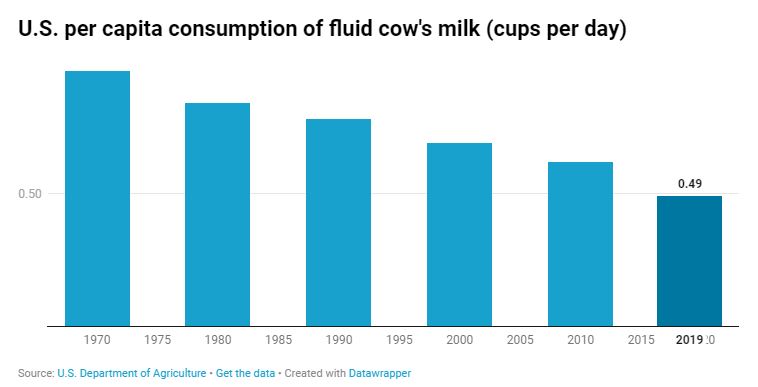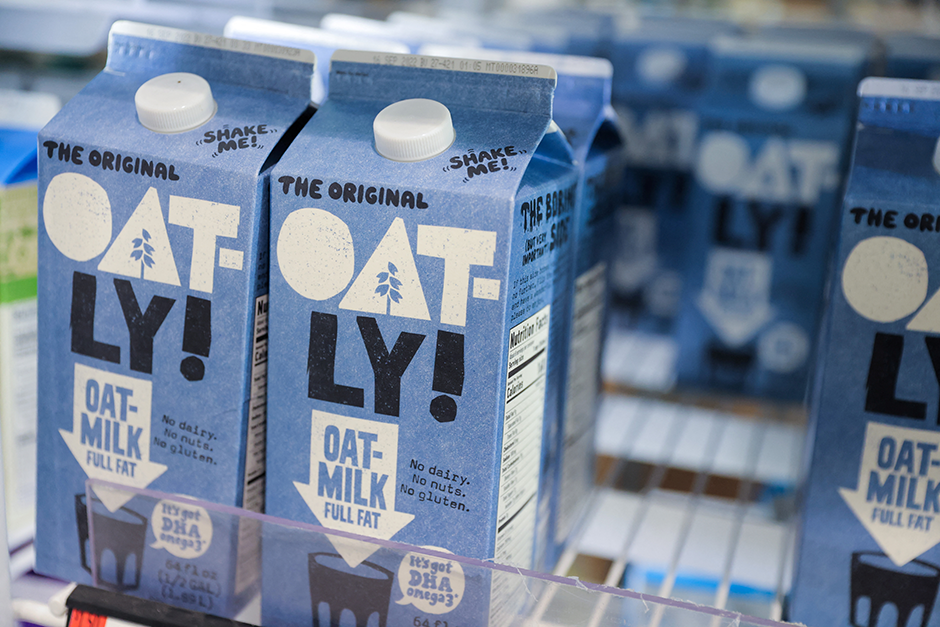
For dairy farmer Lucas Sjostrom, allowing beverages made out of soy, almonds, oats, rice or other plant based products to be called “milk” is more than an encroachment on his market, it’s a personal insult.
“Dairy farmers are offended that someone would try to steal their whole livelihood,” said Sjostrom, the executive director of the Minnesota Milk Producers Association. “We feel that it’s a total theft of our way of life.”
The nation’s dairy farmers insist that plant-based products now labeled as milk be called juices or beverages – or anything but milk.
Yet the Food and Drug Administration recently issued a proposed rule that would allow the makers of beverages made from soybeans, almonds, oats and other plants to continue to label their products milk, as long as the non-dairy products employ qualifiers such as soy milk, and almond milk.
The FDA’s proposed rule, whose final form could be influenced by public comments, would also recommended – but not mandate – that packaging for plant-based drinks make clear the key nutritional differences between their products and cow’s milk.
For instance, if a carton of oat milk contains less vitamin D or calcium than dairy milk does, the label should provide that information to consumers, the FDA said. But adding the nutritional comparison to the carton would be voluntary.
Sjostrom has a herd of 195 dairy cows at a farm in Brooten. He and other dairy farmers have watched plant-based milk products grow in popularity and were heartened when Trump-era FDA director Scott Gottlieb said “almonds do not lactate” and indicated there would be shift towards more stringent labeling requirements for plant-based milks.
Now Sjostrom and the nation’s dairy farmers say they must look to Congress for relief. And senators representing the nation’s top dairy states, including Sen. Tina Smith, D-Minnesota, are willing to comply.
Smith is a co-sponsor of the Dairy Pride Act, legislation introduced last week by Sen. Tammy Baldwin, D-Wisconsin, and Jim Risch, R-Idaho, that would bar the makers of plant-based beverages from labeling their products milk.
“We should be making sure plant-based imitation products are not misleading consumers and putting hardworking dairy farmers at a competitive disadvantage,” Smith said. “This legislation will ensure plant-based alternatives are properly labeled while protecting and supporting Minnesota’s dairy producers.”
The Dairy Pride Act, however, has failed to pass in previous Congresses, and the odds of it succeeding in this Congress are long.
Dairy milk consumption is declining
According to the U.S. Department of Agriculture, Minnesota ranked seventh among the states in milk production in 2021, with California and Wisconsin snaring first and second place.
The USDA has also determined that U.S. milk consumption has dropped steadily over the past few decades, a trend that seems determined to continue. According to the USDA, Americans in 2019 drank nearly half as much milk as they drank in 1970. But increased consumption of other dairy products, especially cheese and yogurt, are making up for much of the decline in milk consumption.
Still, growing awareness of a condition called lactose intolerance that makes it difficult for some people to digest milk has boosted consumption of plant-based beverages.
But the USDA has determined that cow’s milk remains a staple food item and the decrease in milk consumption is more likely due to changes in American dietary habits.
“At some time during 2017, for example, 92% of American households bought cow’s milk,” a USDA Economic Research Survey study said. “Even among those who bought plant-based alternatives, 90 percent still bought cow’s milk. However, the researchers also found that sales of cow’s milk fell over time, while sales of plant-based options rose.”

But the study determined the increase in the purchase of plant-based options was only one-fifth of the size of the decrease in Americans’ purchases of cow’s milk.
“Therefore, sales of plant-based milk alternatives are contributing to – but not a primary driver of – declining sales of cow’s milk,” the study concluded.
Still, Sjostrom said he’s concerned that promotion of plant-based beverages as milk will confuse consumers, many of whom will not be aware that most plant-based beverages won’t contain the nutrients that are present in dairy milk, including proteins and necessary fats.
He cites milk’s reputation as a healthy beverage, reinforced by marketing campaigns with slogans like “Milk: It does a body good.”
“If we don’t continue to save our brand, that hurts us all,” Sjostrom said of both the consumers and producers of milk.
Ariel Wiegard, director of government affairs at the American Soybean Association, has a different take on the issue.
Even though most soybeans grown in Minnesota and the rest of the nation end up as feed for livestock, including dairy cows, Wiegard said soybean farmers are proud to produce soy milk because the sale of the product creates relationship between them and consumers.
“It’s how most consumers are exposed to what our farmers grow,” she said.
Wiegard also said she believes consumers will never confuse soy milk with cow’s milk, and soy milk is a product that’s been around for many years. She said that fortified soy milk has as many nutrients as cow’s milk, although other plant-based beverages may not.
“We do feel pretty positive about the new FDA guidelines,” Wiegard said.
Those who have submitted public comments to the FDA about its proposed new rule are divided on what should be labeled “milk.”
“I would encourage you to change your stance on the fake labeling of nut and other fake milks,” one commenter wrote. “It is not a hard or difficult choice to stop misleading consumers.”
But another told the FDA: “Nobody is confusing plant-based milks with cow’s milk … It is important that plant-based milks be labeled as milk so that those who use these products instead of cow’s milk can feel included.”
The FDA will accept public comments on the proposed rule through April 24.























